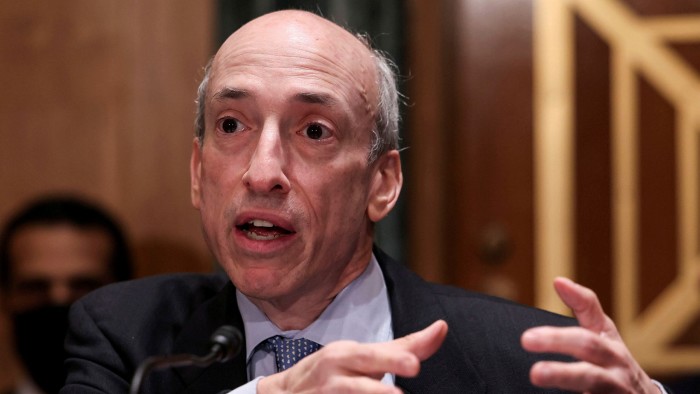SEC chair orders staff to recommend new investor protections for Spacs

Roula Khalaf, Editor of the FT, selects her favourite stories in this weekly newsletter.
Gary Gensler, chair of the Securities and Exchange Commission, has signalled the regulator is poised to heighten scrutiny of blank-cheque companies as authorities bring a flurry of cases against these vehicles.
In a speech on Thursday Gensler articulated the most detailed requests yet for recommendations on the oversight of special purpose acquisition companies, or Spacs.
His remarks come amid a rush of investigations into companies that have chosen to list on stock markets via Spacs, listed shell companies that take private groups public through a merger. Regulators are concerned that the deals may have bypassed the scrutiny that applies to traditional initial public offerings.
This week, Digital World Acquisition Corp — a Spac that is merging with Donald Trump’s entertainment start-up, Trump Media and Technology Group — said the SEC was seeking information on dealings between the entities before they revealed their plans in October.
Lucid Motors, an electric car group that listed in one of the largest-ever Spac deals, is also being investigated by the SEC over its blank-cheque merger. The car company said it received a subpoena from the regulator seeking information on its financial projections when it merged with Churchill Capital Corp IV.
In his speech at a conference, Gensler asked SEC staff to submit recommendations on how to ensure Spac investors received the same protections they would in a traditional listing. “Currently, I believe the investing public may not be getting like protections between traditional IPOs and Spacs,” he said.
Critics of Spacs have long questioned the ability of young companies seeking Spac mergers to present rosy projections to investors, which carry a lower legal risk than in a traditional IPO.
Gensler will seek guidance on how to clarify blank-cheque companies’ disclosure requirements given the “inconsistent and differential disclosure among the various parties” involved in these deals. He pointed to retail investors potentially not receiving “adequate information” about their shares’ dilution as an example.
The chair also raised concerns about Spac sponsors “priming the market” with insufficient statements to “back up their claims” ahead of merging with their target.
“Investors may be making decisions based on incomplete information or just plain old hype,” Gensler said, adding he had asked SEC staff for guidance on how to prevent what “effectively may be improper conditioning of the Spac target IPO market”.
Gensler asked for more scrutiny of directors, sponsors, financial advisers and accountants — what he called the “gatekeepers” in Spac mergers who “carry out functionally the same role as they would in a traditional IPO but may not be performing the due diligence that we’ve come to expect”.
“There may be some who attempt to use Spacs as a way to arbitrage liability regimes,” he said.
Spacs soared in popularity to become Wall Street’s hottest investment product over the past year but Gensler’s comments come as the market has cooled significantly in recent months. Investors have been redeeming their cash at higher rates and a crucial source of institutional financing has dried up, forcing companies to seek more expensive sources of funding.
Last week, digital media group BuzzFeed said investors withdrew 94 per cent of their money from the company’s Spac fund ahead of its listing.
Comments